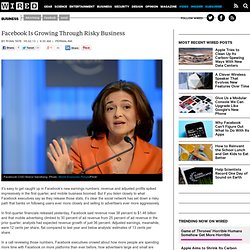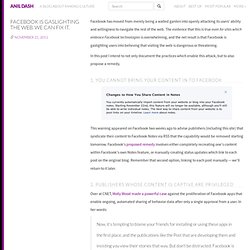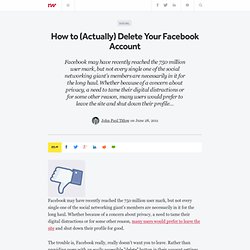

7 Types Of People You Should De-Friend On Faceb... Huffingtonpost. Maximus - Responsive Multipurpose Web Template (shared on themelock.com) How I Made Something Go Viral. Facebook Is For Old People So my girlfriend points out a picture on Facebook of a rich friend on a plane with her dog and I’m reading the comments…and I see that of the wife of a famous movie producer, whose story was told in “Vanity Fair.”

That’s when it hit. If these people are all over Facebook, it’s toast, the oldsters have taken over and the young people have left. It’d be like seeing your parents at Pacha, or the Electric Daisy Carnival, you wouldn’t be interested in going anymore. The above inspiration didn’t take place in a vacuum. Your whole life is useful information. It was 6:35 PM and I had to leave for dinner at 7:30 and I hadn’t yet taken a shower. Yes, I can write that fast. Furthermore, I can write this fast and this cogently because I’ve been doing it for so long.
Was minimal. Don’t judge the success of your project instantly. Furthermore, don’t honor the initial feedback, which tends to be knee-jerk. Sign-ups to my mailing list were growing in leaps and bounds. Facebook Is Growing Through Risky Business. It’s easy to get caught up in Facebook’s new earnings numbers; revenue and adjusted profits spiked impressively in the first quarter, and mobile business boomed.

But if you listen closely to what Facebook executives say as they release those stats, it’s clear the social network has set down a risky path that banks on following users ever more closely and selling to advertisers ever more aggressively. In first-quarter financials released yesterday, Facebook said revenue rose 38 percent to $1.46 billion and that mobile advertising climbed to 30 percent of ad revenue from 25 percent of ad revenue in the prior quarter; analysts had expected revenue growth of just 36 percent. Adjusted earnings, meanwhile, were 12 cents per share, flat compared to last year and below analysts’ estimates of 13 cents per share.
Then they talked about change. So Facebook is moving to meet both camps, and doing so with impressive speed. Take mobile advertising. Katya's Non-Profit Marketing Blog. Tue, December 11 2012 Filed under: Social Media • There’s been a huge amount of chatter online about Facebook changes that nonprofits and companies say have harmed their engagement efforts on the social network - and an equal amount of information refuting that claim.
I have been wanting to write a post clarifying matters, but after spending a month reading countless articles on both sides of the argument, I wasn’t sure what to believe. So I reached out to a Facebook expert, John Haydon, who provided these excellent, understandable and level-headed responses to my questions. I hope his responses prove as helpful to you as they did to me. Learn more about John here. Katya: Could you explain in plain English how Facebook updates work and what supporters see? John: When a page publishes an update (photos, videos, text only updates, links), some of the people who have liked that page will see that update in their newsfeed. Katya: What is organic reach and what is the Edgerank algorithm?
1. 1. Exploring Privacy Management on Facebook: Motivations and Perceived Consequences of Voluntary Disclosure - Waters - 2011 - Journal of Computer-Mediated Communication. Facebook is gaslighting the web. We can fix it. Facebook has moved from merely being a walled garden into openly attacking its users' ability and willingness to navigate the rest of the web.

The evidence that this is true even for sites which embrace Facebook technologies is overwhelming, and the net result is that Facebook is gaslighting users into believing that visiting the web is dangerous or threatening. In this post I intend to not only document the practices which enable this attack, but to also propose a remedy. 1. You Cannot Bring Your Content In To Facebook This warning appeared on Facebook two weeks ago to advise publishers (including this site) that syndicate their content to Facebook Notes via RSS that the capability would be removed starting tomorrow. 2.
Over at CNET, Molly Wood made a powerful case against the proliferation of Facebook apps that enable ongoing, automated sharing of behavior data after only a single approval from a user. 3. Www.midem.com/RM/RM_Midem_v2/pdf/whitepapers/midem-2012-whitepaper-marketing-music-on-facebook.pdf. Facebook Disconnect. Facebook Is Tracking Your Every Move on the Web; Here's How to Stop It. How to hide / remove tagged photos on top of Facebook profile.
How to (Actually) Delete Your Facebook Account. Facebook may have recently reached the 750 million user mark, but not every single one of the social networking giant's members are necessarily in it for the long haul.

Whether because of a concern about privacy, a need to tame their digital distractions or for some other reason, many users would prefer to leave the site and shut down their profile for good. The trouble is, Facebook really, really doesn't want you to leave. Rather than providing users with an easily accessible "delete" button in their account settings, they instead offer the option to "deactivate" one's profile, which essentially makes it disappear until one log back in, at which point the profile is restored as though nothing ever happened.
As anybody who's attempted to deactive their Facebook profile knows, the company throws up yet another small roadblock by piling on a massive guilt trip in which they display pictures of friends and family and emphasize just how badly all of those people will miss you.